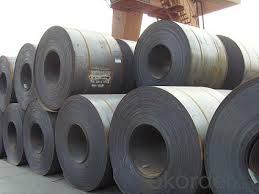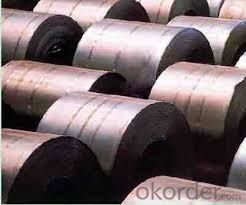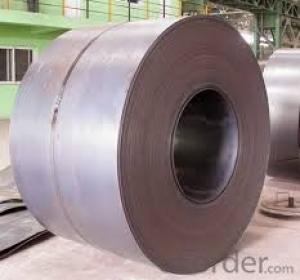hot rolled steel coil DIN 17100 in Good Quality
- Loading Port:
- China main port
- Payment Terms:
- TT OR LC
- Min Order Qty:
- 30 m.t.
- Supply Capability:
- 500000 m.t./month
OKorder Service Pledge
OKorder Financial Service
You Might Also Like
Description:
Hot-Rolled Steel Sheets and Coils are applied to a wide range of uses such as automobile, electrical appliance, m achinery manufacturing, container manufacturing, shipbuilding, bridge, pipeline, and receive high acclaim from our customers for its excellent quality.
Specification
Product: | Hot Rolled Steel Coils/Sheets |
Material: | Q195,Q235,A36,SS400,S235JR,Q345,ST37-2, CCSB etc |
Standard : | JIS G3002 GB/T251B |
Technique: | hot rolled |
Thickness | 1.2mm to 200mm |
Tolerance of thickness: | :+/-0.03mm |
Width: | 750mm-2000mm |
Tolerance of width: | :+/-5.00mm (aiming to +/-2.00mm) |
Normal width: | 914mm, 1000mm, 1200mm, 1219mm, 1250mm,1500mm |
Length: | According to requirement |
Coil ID: | 508mm-610mm |
Coil Weight: | 10-25 Metric Tons |
Surface: | Black, Chromate, fingerprint resistant treatment, slight oiled or non-oiled, dry |
Port of Loading: | Tianjin/Shanghai port |
Packaging Details: | Standard export packing or according to the clients required |
Delivery Time | Within 30 days after received 30% deposit or workable L/C |
Payment Terms: | L/C,T/T |
Image:


We can ensure that stable quality standards are maintained, strictly meeting both market requirements and customers’ expectations. Our products enjoy an excellent reputation and have been exported to Europe, South-America, the Middle-East, Southeast-Asia, Africa and Russia etc.. We sincerely hope to establish good and long-term business relationship with your esteemed company.
- Q:How are steel coils inspected for surface defects using non-destructive testing methods?
- To ensure the quality and integrity of steel coils, non-destructive testing (NDT) methods are employed to inspect them for surface defects. Several common NDT methods are utilized in this process. Visual inspection is one of the most widely used methods, where trained inspectors visually examine the steel coils for visible defects like scratches, cracks, pits, or corrosion. Although this method is simple and cost-effective, it can only detect surface-level defects. Magnetic particle testing (MT) is another commonly used NDT method. It utilizes magnetism to identify surface and near-surface defects in ferromagnetic materials like steel. By applying a magnetic field and iron particles to the steel coil, any defects such as cracks or discontinuities become visible as the iron particles concentrate around them. Liquid penetrant testing (PT) is a different NDT method used for inspecting steel coils. It involves applying a liquid penetrant to the coil's surface, which is drawn into surface defects through capillary action. After removing excess penetrant and applying a developer, the defects become visible as the developer draws out the penetrant. Ultrasonic testing (UT) is widely used to detect both surface and subsurface defects in steel coils. It transmits high-frequency sound waves into the coil and analyzes the reflected waves to identify abnormalities. This method can detect defects like cracks, inclusions, and voids that may not be visible to the naked eye. Additionally, eddy current testing (ECT) is another NDT method for inspecting steel coils. It utilizes electromagnetic induction to detect surface and near-surface defects. By placing a coil carrying an alternating current near the surface of the coil being inspected, any changes in the coil's electrical conductivity caused by surface defects are detected and analyzed to identify and evaluate their severity. In summary, various non-destructive testing methods such as visual inspection, magnetic particle testing, liquid penetrant testing, ultrasonic testing, and eddy current testing are utilized to inspect steel coils for surface defects. These methods ensure the quality and integrity of the steel coils before they are used in various applications.
- Q:I just got this aftermarket exhaust on my truck and it's recommended that it be welded, but the metal is aluminized steel. How do I mig weld aluminized steel?
- Welding Aluminized Steel
- Q:steel bollard poles?
- There those short yellow post's the are too short to see when you back into them.
- Q:How are steel coils used in the manufacturing of automotive exhaust systems?
- Steel coils are used in the manufacturing of automotive exhaust systems as they provide the necessary strength and durability required for this critical component. These coils are typically shaped and formed into various parts such as pipes, mufflers, and catalytic converters, which are then welded together to create the exhaust system. The steel coils also undergo additional processes like coating or galvanizing to enhance corrosion resistance, ensuring the longevity of the exhaust system.
- Q:How would you calculate the maximum plastic deformation (expansion) a steel pipe can handle before it actually fails?
- You can calculate the maximum reversible strain, for elastic loading as follows: You need to look up the yield strength (for that particular type of steel). Divide this yield strength by the elastic modulus of steel (also called Young's modulus). That gives you the strain at the onset of yielding, the maximum you can strain the steel fibers before crossing the point of no return. If you are interested in the strain until failure, you need to take tensile test measurements. Seldom do people document an equation to model the non-elastic portion of the stress-strain curve of the specimen, because seldom do we design systems to operate with materials which yield. We want systems which only deform reversibly and elastically. This means you need to perform an experiment to find what you are actually desiring to know.
- Q:Can steel coils be used in the production of furniture?
- Yes, steel coils can be used in the production of furniture. Steel coils can be used to create sturdy frames for furniture such as chairs and sofas. The coils can be shaped and welded together to provide support and durability to the furniture.
- Q:What are the challenges in coil blanking for complex shapes?
- Coil blanking for complex shapes poses several challenges, primarily due to the intricate nature of the shapes involved. One significant challenge is achieving precision and accuracy in cutting the coils to create the desired shape. Complex shapes often require intricate cuts and tight tolerances, which necessitates advanced cutting techniques and machinery. Additionally, maintaining consistency throughout the entire coil length can be challenging, as any deviation can result in imperfect shapes. Furthermore, handling and manipulating the coils during the blanking process can be difficult, especially if the shapes are intricate or delicate. Overall, the challenges in coil blanking for complex shapes revolve around achieving precise cuts, maintaining consistency, and effectively handling the coils to ensure high-quality finished products.
- Q:How are steel coils tested for dimensional accuracy?
- Steel coils are typically tested for dimensional accuracy using various methods such as measuring the width, thickness, and diameter of the coil. This can be done using specialized instruments like calipers, micrometers, and laser scanners to ensure the coil's dimensions meet the required specifications.
- Q:I'm ordering a Pair of tongs(a tool used to dig quahogs in bays that scrapes the bottom constantly) and what type of metal would be the best to fabricate it, steel or stainless steel?
- Stainless okorder
- Q:How are steel coils processed for edge trimming or slitting during processing?
- Steel coils are processed for edge trimming or slitting during processing by utilizing specialized machinery. The coils are unwound and fed into the machine, where the edges are trimmed off to achieve the desired width. For slitting, the coil is passed through multiple sets of circular blades that cut it into narrower strips. This process ensures precise dimensions and smooth edges, making the steel coils ready for further applications.
1. Manufacturer Overview |
|
|---|---|
| Location | |
| Year Established | |
| Annual Output Value | |
| Main Markets | |
| Company Certifications | |
2. Manufacturer Certificates |
|
|---|---|
| a) Certification Name | |
| Range | |
| Reference | |
| Validity Period | |
3. Manufacturer Capability |
|
|---|---|
| a)Trade Capacity | |
| Nearest Port | |
| Export Percentage | |
| No.of Employees in Trade Department | |
| Language Spoken: | |
| b)Factory Information | |
| Factory Size: | |
| No. of Production Lines | |
| Contract Manufacturing | |
| Product Price Range | |
Send your message to us
hot rolled steel coil DIN 17100 in Good Quality
- Loading Port:
- China main port
- Payment Terms:
- TT OR LC
- Min Order Qty:
- 30 m.t.
- Supply Capability:
- 500000 m.t./month
OKorder Service Pledge
OKorder Financial Service
Similar products
New products
Hot products
Related keywords






























